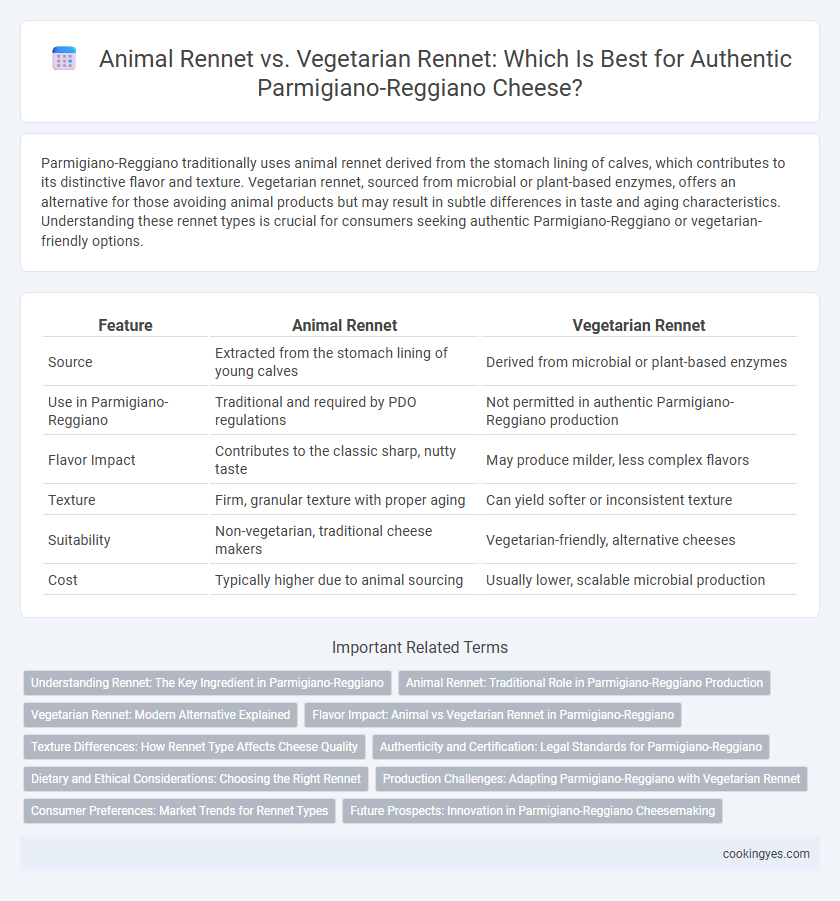Parmigiano-Reggiano traditionally uses animal rennet derived from the stomach lining of calves, which contributes to its distinctive flavor and texture. Vegetarian rennet, sourced from microbial or plant-based enzymes, offers an alternative for those avoiding animal products but may result in subtle differences in taste and aging characteristics. Understanding these rennet types is crucial for consumers seeking authentic Parmigiano-Reggiano or vegetarian-friendly options.
Table of Comparison
| Feature | Animal Rennet | Vegetarian Rennet |
|---|---|---|
| Source | Extracted from the stomach lining of young calves | Derived from microbial or plant-based enzymes |
| Use in Parmigiano-Reggiano | Traditional and required by PDO regulations | Not permitted in authentic Parmigiano-Reggiano production |
| Flavor Impact | Contributes to the classic sharp, nutty taste | May produce milder, less complex flavors |
| Texture | Firm, granular texture with proper aging | Can yield softer or inconsistent texture |
| Suitability | Non-vegetarian, traditional cheese makers | Vegetarian-friendly, alternative cheeses |
| Cost | Typically higher due to animal sourcing | Usually lower, scalable microbial production |
Understanding Rennet: The Key Ingredient in Parmigiano-Reggiano
Animal rennet, derived from the stomach lining of calves, is the traditional enzyme used in authentic Parmigiano-Reggiano production, essential for curdling milk and developing its signature texture and flavor. Vegetarian rennet, often microbially or genetically engineered, offers an alternative but is not permitted in true Parmigiano-Reggiano cheese according to PDO regulations. Understanding the role of animal rennet underscores the strict artisanal process critical to maintaining the cheese's unique taste and quality.
Animal Rennet: Traditional Role in Parmigiano-Reggiano Production
Animal rennet, derived from the stomach lining of calves, plays a crucial role in the traditional production of Parmigiano-Reggiano, contributing to its distinctive texture and flavor profile. This natural enzyme facilitates the coagulation of milk, initiating the curdling process essential for developing the cheese's characteristic granular structure. The exclusive use of animal rennet aligns with the strict production regulations that preserve the authenticity and quality of Parmigiano-Reggiano.
Vegetarian Rennet: Modern Alternative Explained
Vegetarian rennet, derived from microbial or plant sources, offers a modern alternative for producing Parmigiano-Reggiano without traditional animal enzymes. This rennet type caters to vegetarians and those concerned with ethical consumption while maintaining similar coagulation properties essential for cheese texture and flavor development. As demand for sustainable and cruelty-free cheese production grows, vegetarian rennet continues to gain acceptance in artisanal and commercial cheese-making processes.
Flavor Impact: Animal vs Vegetarian Rennet in Parmigiano-Reggiano
Animal rennet, derived from the stomach lining of calves, imparts a richer, more complex flavor and authentic texture to Parmigiano-Reggiano, enhancing its nutty and savory notes. Vegetarian rennet, typically microbial or plant-based, produces a milder taste and can slightly alter the traditional flavor profile, often resulting in a less sharp and less nuanced cheese. For true Parmigiano-Reggiano, strict PDO regulations mandate the use of animal rennet to preserve its distinctive flavor and texture.
Texture Differences: How Rennet Type Affects Cheese Quality
Parmigiano-Reggiano traditionally uses animal rennet, which contains specific enzymes that contribute to its granular, crystalline texture and rich umami flavor by promoting optimal protein breakdown during aging. Vegetarian rennet, often derived from microbial or plant sources, can result in a slightly softer texture and less pronounced crystallization due to differences in enzyme composition and activity. These texture variations influence the cheese's mouthfeel and aging profile, affecting overall quality and authenticity in Parmigiano-Reggiano production.
Authenticity and Certification: Legal Standards for Parmigiano-Reggiano
Parmigiano-Reggiano must be produced using traditional animal rennet derived from the stomach lining of calves to comply with PDO certification and legal standards set by the Consorzio del Formaggio Parmigiano-Reggiano. Vegetarian rennet, often microbial or plant-based, does not meet these stringent authenticity requirements and disqualifies the cheese from bearing the Parmigiano-Reggiano label. This strict regulation ensures the preservation of traditional production methods and guarantees the cheese's unique flavor and texture profile.
Dietary and Ethical Considerations: Choosing the Right Rennet
Parmigiano-Reggiano cheese traditionally uses animal rennet derived from the stomach lining of calves, ensuring authentic flavor and texture but limiting suitability for vegetarians and some ethical consumers. Vegetarian rennet, typically sourced from microbial or plant enzymes, offers an alternative that accommodates vegetarian diets and aligns with animal welfare concerns, although it may slightly alter the cheese's traditional characteristics. Selecting between animal and vegetarian rennet involves balancing dietary preferences with ethical values, particularly for those seeking authentic Parmigiano-Reggiano within specific lifestyle guidelines.
Production Challenges: Adapting Parmigiano-Reggiano with Vegetarian Rennet
Parmigiano-Reggiano's traditional production relies on animal rennet derived from calf stomachs, which ensures the cheese's distinct texture and flavor through precise enzymatic activity. Substituting vegetarian rennet presents challenges, as plant-based or microbial enzymes can alter curd formation and aging processes, risking deviations from strict PDO standards. Manufacturers face ongoing research to replicate authentic coagulation and maturation while maintaining certification compliance and the cheese's hallmark characteristics.
Consumer Preferences: Market Trends for Rennet Types
Consumer preferences for Parmigiano-Reggiano increasingly favor traditional animal rennet due to its authentic flavor profile and adherence to PDO regulations. Market trends reveal a growing niche demand for vegetarian rennet, driven by vegan and lactose-intolerant segments seeking ethical and dietary alternatives. Producers balancing authenticity with inclusivity are exploring hybrid approaches to meet diverse consumer demands without compromising quality.
Future Prospects: Innovation in Parmigiano-Reggiano Cheesemaking
Innovation in Parmigiano-Reggiano cheesemaking explores sustainable alternatives to animal rennet, including microbial and genetically engineered vegetarian rennets, aiming to preserve traditional flavors while meeting ethical and dietary demands. Advances in biotechnology enable production of consistent enzyme quality, potentially enhancing yield and maturation processes without compromising the cheese's protected designation of origin status. Future prospects involve integrating cutting-edge rennet substitutes to support environmental sustainability and cater to expanding vegetarian markets, ensuring Parmigiano-Reggiano remains a globally respected cheese.
Animal Rennet vs Vegetarian Rennet for Parmigiano-Reggiano Infographic

 cookingyes.com
cookingyes.com